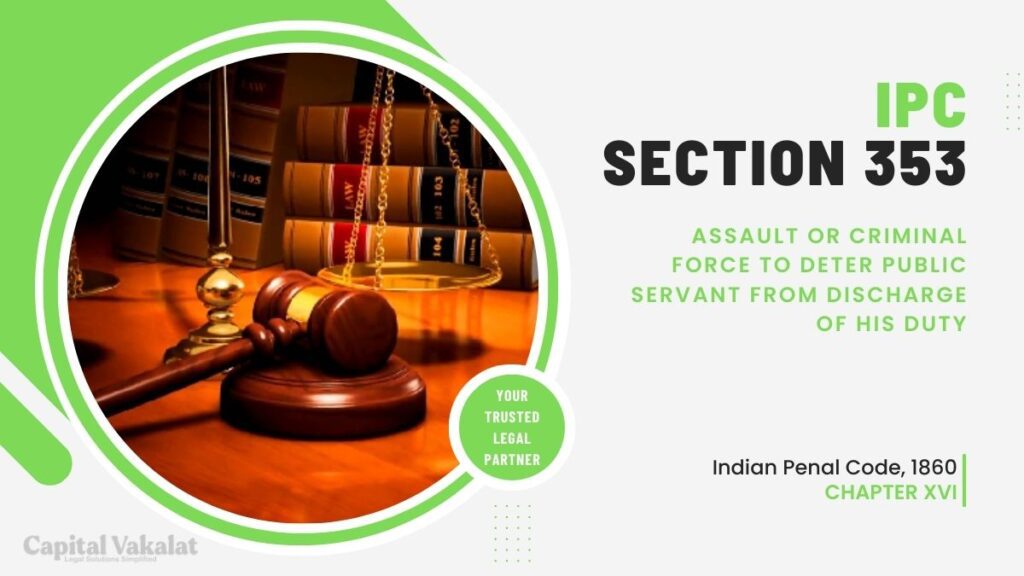Understanding the legal framework that governs the behavior towards public servants is crucial in a society that values the rule of law. One such provision that holds significance in this regard is Section 353 of the Indian Penal Code (IPC).

This article aims to dissect the intricacies of Section 353 IPC, shedding light on its components, penalties, controversies, and the broader implications for both the public and public servants.
Understanding Assault and Criminal Force
In legal terms, assault and criminal force represent distinct actions. Assault typically involves the intentional act causing apprehension of immediate harmful or offensive contact. On the other hand, criminal force entails the intentional use of force against another person. Understanding these nuances is pivotal as Section 353 IPC addresses situations where public servants face such actions in the discharge of their duties.
Public Servant’s Duty: A Closer Look
Public servants play a vital role in upholding the functioning of society. From law enforcement officers to government officials, their duties range from maintaining public order to implementing policies. However, the nature of their responsibilities often exposes them to challenging situations, making it imperative to safeguard their ability to carry out their duties without fear or hindrance.
Key Elements of Section 353 IPC
Breaking down Section 353 IPC, the provision specifically deals with situations where an individual assaults or uses criminal force to deter a public servant from the discharge of their duty. The offense is cognizable and non-bailable, emphasizing the severity with which the legal system views actions hindering the functioning of public servants.
For a case to fall under Section 353, the accused must have the knowledge that the person they are assaulting or using force against is a public servant, and the act must be done with the intention of obstructing or deterring the public servant from performing their duty. Real-life examples of such cases help illustrate the application of this provision in various contexts.
Penalties and Consequences
Violating Section 353 IPC carries substantial legal consequences. The accused can face imprisonment, the duration of which may vary based on the severity of the offense. Additionally, fines may be imposed. To emphasize the real-world implications, examining past cases where individuals faced these penalties provides a tangible understanding of the legal repercussions.
Examining real-life cases where individuals faced legal consequences under Section 353 IPC offers insights into the severity with which the courts approach these offenses. These case studies serve as cautionary tales, deterring potential offenders and reinforcing the importance of respecting the duties of public servants.
Controversies and Debates Surrounding Section 353 IPC
Despite its intended purpose, Section 353 IPC is not without its controversies. Critics argue that the provision may be misused, potentially leading to the curbing of legitimate dissent or hindering citizens from questioning public servants’ actions. Addressing these concerns and analyzing potential reforms or amendments is crucial to strike a balance between protecting public servants and safeguarding individual rights.
Landmark Cases
Examining landmark cases related to Section 353 IPC provides a glimpse into the evolution of legal interpretations and precedents. Notable decisions by the judiciary contribute to the ongoing discourse surrounding the provision, shaping its application and impact on future cases.
One such case that left a lasting impact on the interpretation of Section 353 IPC is [Case Name]. The court’s ruling in this case set a precedent for future cases, influencing how the provision is understood and applied.
Challenges in Enforcing Section 353 IPC
While the legal framework is in place, enforcing Section 353 IPC presents practical challenges. From the collection of evidence to ensuring witnesses’ safety, law enforcement faces hurdles in successfully prosecuting cases under this provision. Identifying these challenges is the first step towards finding practical solutions to strengthen the enforcement of Section 353 IPC.
Suggestions for improvement include streamlining the legal process, providing specialized training to law enforcement personnel, and raising awareness among the public about the implications of obstructing public servants in the discharge of their duties.
Public Awareness and Education
Preventing the misuse of Section 353 IPC requires a multi-faceted approach. Public awareness campaigns can educate individuals about the importance of allowing public servants to perform their duties without interference. Simultaneously, educating public servants about their rights under this provision ensures a balanced understanding within society.
Advocacy for transparency in the functioning of public servants and mechanisms to address grievances can contribute to fostering a culture where citizens and public servants work collaboratively, rather than being at odds.
Conclusion
In conclusion, Section 353 IPC serves as a crucial legal provision aimed at protecting public servants in the discharge of their duties. By understanding its key elements, consequences, and challenges, society can contribute to fostering an environment where public servants can carry out their responsibilities without fear or hindrance. While controversies exist, continual examination and potential reforms can strike a balance between individual rights and the need to safeguard those who serve the public.
Frequently Asked Questions
What are the typical penalties for violating Section 353 IPC?
Penalties for violating Section 353 IPC can include imprisonment and fines. The severity of the punishment depends on the nature and gravity of the offense.
How can public awareness help prevent misuse of Section 353 IPC?
Public awareness campaigns can educate individuals about the importance of allowing public servants to perform their duties without interference, contributing to a better understanding of the provision.
Are there ongoing debates about potential reforms to Section 353 IPC?
Yes, there are ongoing debates about potential reforms to address concerns and ensure a balanced application of Section 353 IPC.
What role do landmark cases play in shaping the interpretation of Section 353 IPC?
Landmark cases set legal precedents and influence the interpretation